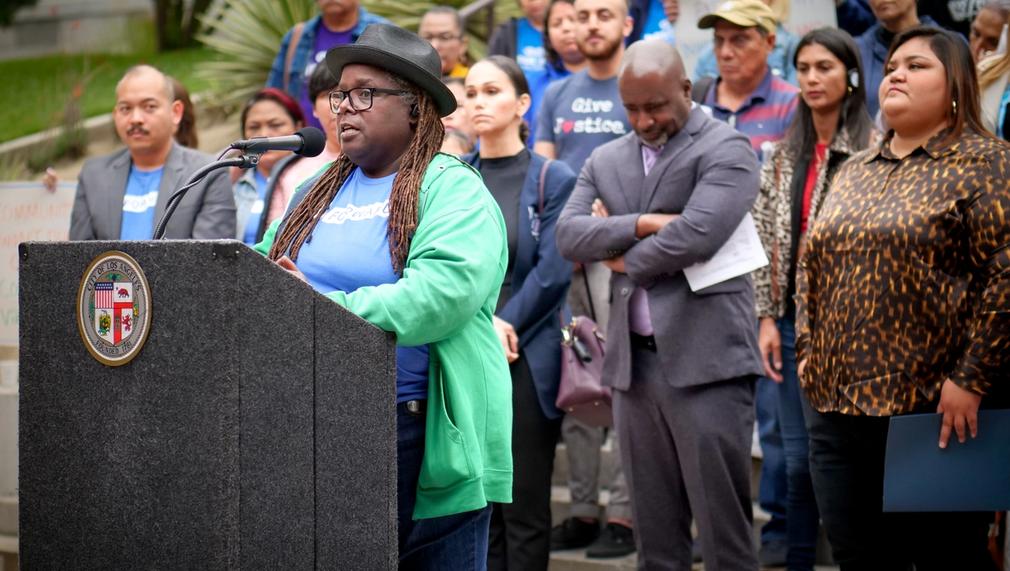Scaling Up Compassionate, Effective, Unarmed Crisis Response
LA City is considering forming a Department of Community Safety (DCS) and we have a unique window to shape it. LA Forward Institute has a plan to engage the public to ensure the DCS is designed to work effectively and equitably. We’ll publish a series of podcast episodes to educate the public around different ways of imagining community safety and host education opportunities including teach-ins, working groups, and a Crisis Response Summit that will lay the groundwork for large-scale advocacy.

What is the primary issue area that your application will impact?
Community safety
In which areas of Los Angeles will you be directly working?
City of Los Angeles (select only if your project has a citywide benefit)
In what stage of innovation is this project, program, or initiative?
Expand existing project, program, or initiative (expanding and continuing ongoing, successful work)
What is your understanding of the issue that you are seeking to address?
According to a 2023 LA Police Department use-of-force report, of the 34 people shot by police, 13 instances involved individuals experiencing homelessness and 12 included people having a mental health crisis – a 12% increase over 2022. Data shows that the vast majority of civilian-initiated 911 calls in LA City are not related to violence or crimes, yet all 911 calls are currently routed by default to operators under the police department. This has led to people who are homeless and/or in crisis increasingly becoming the victims of police violence.
Meanwhile, cities like Denver and Eugene, OR are piloting citywide programs to send paramedics and mental health professionals, instead of law enforcement, to many nonviolent 911 calls. As a city struggling with so many challenges, we must evolve our current emergency management systems to include a 24/7, coordinated, comprehensive, care-based, and region-wide response infrastructure to assist people experiencing acute distress.
Describe the project, program, or initiative this grant will support to address the issue.
At LA Forward Institute, we’re working with officials at the city, county, state, and federal level to educate the public and develop a comprehensive, coordinated, care-based, compassionate, and trauma-informed response to people experiencing crises in LA City and County. As LA City considers forming a Department of Community Safety, we’ll amplify the voices of groups imagining and creating alternative models of safety. A grant from LA2050 will help support our plans for the coming year which include:
A six-episode podcast series featuring interviews with people on the frontlines of reimagining community safety stakeholders such as coalitions working to remove police from traffic stops, Metro Ambassadors, and more
Ongoing education and advocacy efforts led by our 50-person “Unarmed Crisis Response Working Group,” which meets weekly to strategize and plan all upcoming work
Educational events such as teach-ins for the general public and individual meetings with people who are working directly with crisis-response policy and administration within local government.
A second-annual comprehensive Crisis Response Summit that will be open to the public (including government officials, service providers, nonprofits, impacted community members, etc.) and offer a platform for everyone to come together to discuss the current inadequate state of crisis response services, ask questions, and focus on a shared vision for the future.
Describe how Los Angeles County will be different if your work is successful.
We envision a future where all people in LA County are able to easily access compassionate, effective, and trauma-informed care when experiencing a crisis. The intended impact of this initiative is to change current systems so that our community employs coordinated services and resources to minimize the need for use of force and get people the help they need. As demonstrated by other successful pilot programs across the country, this drastic shift of approach will ultimately lead to lower crime rates, less violence and murders perpetrated by the police, increased community-wide mental health benefits, and a significant cost savings for taxpayers.
Long-term scaling would involve building out our efforts with a dedicated team and sufficient resources to continue our education and advocacy work. Additionally, we are working towards the creation of permanent community roles at the city and regional level devoted to sustaining a whole and well-functioning crisis-response system.
Approximately how many people will be impacted by this project, program, or initiative?
Direct Impact: 2,500
Indirect Impact: 4,000,000